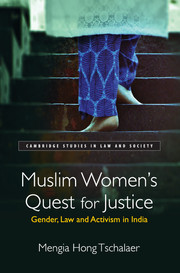Book contents
- Frontmatter
- Dedication
- Contents
- Preface
- Acknowledgements
- Abbreviations
- 1 From Legal Binaries to Configurations: Muslim Women's Rights Activism in South Asia
- 2 A Multidimensional Approach to Muslim Women's Activism: Mapping the Legal Landscape in the City of Lucknow
- 3 Destabilising Gendered Proprieties: Muslim Women's Visibility within the Public Space
- 4 Vying for a Gender Just Islamic Marriage Contract: Women's Legal Spaces
- 5 Legal Realities: Doing Gender Justice from Below
- 6 Muslim Women's Quest for Justice: Theoretical Implications and Policy Suggestions
- 7 Appendices: Model-Nikahnamas
- 8 Glossary
- 9 Bibliography
- 10 Index
2 - A Multidimensional Approach to Muslim Women's Activism: Mapping the Legal Landscape in the City of Lucknow
Published online by Cambridge University Press: 08 February 2018
- Frontmatter
- Dedication
- Contents
- Preface
- Acknowledgements
- Abbreviations
- 1 From Legal Binaries to Configurations: Muslim Women's Rights Activism in South Asia
- 2 A Multidimensional Approach to Muslim Women's Activism: Mapping the Legal Landscape in the City of Lucknow
- 3 Destabilising Gendered Proprieties: Muslim Women's Visibility within the Public Space
- 4 Vying for a Gender Just Islamic Marriage Contract: Women's Legal Spaces
- 5 Legal Realities: Doing Gender Justice from Below
- 6 Muslim Women's Quest for Justice: Theoretical Implications and Policy Suggestions
- 7 Appendices: Model-Nikahnamas
- 8 Glossary
- 9 Bibliography
- 10 Index
Summary
The legal landscape in the city of Lucknow is complex, featuring a variety of non-state legal bodies which are currently involved in the discursive struggles over the institutional power to uphold, regulate, or adjust ‘correct’ Islamic practices regarding marriage and the family. Within the last decade, the city of Lucknow has experienced an extraordinary proliferation of Muslim women's organisations which aim at publicly overturning chauvinistic ideals of women's subjectivity in Islam within a contested sociopolitical landscape. The current rise of political Islam in the city of Lucknow, nourished by ideological tensions between Sunni and Shia groups (Freitag 1989,249), galvanised both Sunni and Shia women to openly destabilise relations of power and question established ideas of gender equality in Islam. However, whereas Shia women tend to debate issues of Islamic law and practice within the intimate comfort zone of their traditional spiritual meetings called majlis, which usually take place on religious sites such as mosque courtyards, Sunni women have more recently carried their struggle for justice into the politically and ideologically contested public sphere. As mentioned above, the presidents and founding members of the All India Muslim Women's Personal Law Board (AIMWPLB), Indian Muslim Women's Movement or the Bharatiya Muslim Mahila Andolan (BMMA), and Bazme Khawateen, which are at the centre of this study, are amongst the most vocal Muslim women's activists in the city. These newly emerging Muslim women's rights activisms in the city of Lucknow is part of and constitutive to a highly linguistically, ideologically, economically, and politically scattered Muslim community.
The activists and members of the different Muslim women's rights organisations featured in this study speak different languages, prefer different Islamic clothing styles, live in different neighbourhoods, interact with different institutions, and, not surprisingly, cultivate unique relationships with the state and with the Muslim leadership. As Shaista Amber (AIMWPLB), a well-known Lucknow Muslim women's rights activist, puts it: ‘I hardly collaborate with other women's rights activists in the city despite the fact that our goals are so similar.
- Type
- Chapter
- Information
- Muslim Women's Quest for JusticeGender, Law and Activism in India, pp. 40 - 80Publisher: Cambridge University PressPrint publication year: 2017



